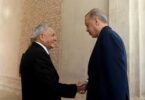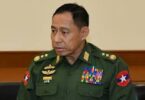F.P. Report
WASHINGTON: Pakistan’s Ambassador to Washington, Ambassador Asad Majeed Khan said that Pakistan desired a long-term and broad-based partnership with the United States, which had historically been a factor for stability in South Asia.
Khan also briefed Sen. Romney on the regional situation in the backdrop of recent tensions between Pakistan and India.
This he said during a meeting with the former presidential candidate and Republican Senator Mitt Romney on Capitol Hill on Thursday.
Senator Romney has recently assumed Chair of the Senate Foreign Relations Subcommittee on South Asia and he also serves on the Senate Homeland Security and Governmental Affairs Committee as well as the Senate Health, Education, Labor and Pensions and the Senate Small Business and Entrepreneurship Committees.
Amb. Khan noted that the restraint and maturity shown by Pakistan’s leadership, highlighted by Prime Minister Imran Khan’s decision to release the pilot of a downed Indian aircraft, had been critical to de-escalating the situation between Pakistan and India. He also appreciated the role played by the Trump Administration in this regard.
The Ambassador cautioned that lasting peace and stability in South Asia would remain elusive as long as India continues to deny the people of Occupied Kashmir their legitimate right to self-determination. He reiterated Pakistan’s desire to resolve the core regional dispute through dialogue.
Asad Khan added that Pakistan wanted to work with the United States to bring peace to Afghanistan. As a victim of blowback from nearly 40 years of instability and violence in Afghanistan, Pakistan had long held that there was no military solution to the conflict. Pakistan was, therefore, committed to facilitating the Afghan peace process, which was ultimately the shared responsibility of all stakeholders in the region’s stability.
Sen. Romney thanked the Ambassador for his briefing. He agreed that sustained engagement between Pakistan and the United States remained critical to regional stability.






